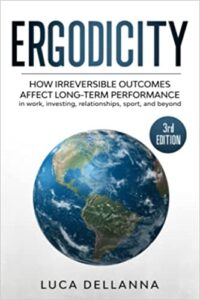Managing Risk for Long-Term Success
By Brennan Beausir
Luca Dellanna is a management advisor, author, and researcher. Luca has published nine books and is currently operating a consulting practice in Italy and Singapore.

On this episode of EconTalk, host Russ Roberts and Dellanna engage with Luca’s book: Ergodicity: . Roberts and Dellanna trade examples of maximizing chances for success by staying in the game- managing risks and accounting for the variation of outcomes. Dellanna offers the example of his cousin, a talented professional skier, who unfortunately had his career cut short by serious injury. Dellanna stresses the importance of managing risks to stay in the game, and that success is not a short-term endeavor. How do you manage the risks in your life to both avoid ruin and maximize your chances at success? How do time horizons relating to a goal and its sustainability influence decision-making?
Share your thoughts and experience with us today. As Russ always says, we love to hear from you.
Roberts and Dellanna agree that a process that can have an irreversible outcome should be treated with extreme caution. Roberts’ suggests that trying to meet the average is inferior to continuing to play the game. Risks should be handled with a hope that one can continue a process instead of exposing oneself to too much risk and falling to ruin.
How can a long-term approach assist in protecting yourself from ruin? What causes some to ignore care for the future, incurring great risks for short-tern success? How might Dellanna’s approach change the mindset of such a person?
Roberts talks about his role as president of Shalem College. He is under a short-term contract and can only serve up to 12 years as president of the school. He presents the principal-agent problem his position illustrates- the school board, or principal, and him, the agent. Russ takes the approach of acting as if he would have a lifetime contract, looking out for the school’s best interest beyond his time there. But is that a feature of the contract, or a feature of Russ?
What is an example of a situation where short-term, individual benefits severely outweigh the aggregate good that goes beyond one’s own time horizon? To what extent do you think Roberts’ situation encourages a Dellanna-style approach to decision-making? How might you use Dellanna’s approach to design a better contract?
A recurring theme of the episode is weighing the average versus the variance of a given event. Dellanna gives the example of a pandemic occurring; the probability is low, but over a lifetime, that probability accumulates and the chances of a pandemic are high. Russ makes the point that low-risk activities measured in the sense of probability versus outcome can be very dangerous when you come out on the reward side of a risk any number of times, “…it lulls you into thinking..eh, I’m safe!” (Roberts, 24:15).
What is a behavior that you have noticed or that you have yourself have engaged in that could fit into this category (pandemic-related or otherwise)? Why else is it so hard to be a rule-follower, knowing that even though a process is low-risk in probability, its outcome can be ruinous?
Dellanna and Roberts discuss near-misses and the attention that should be given to them so people create and remember safer habits and regulations, versus retreating from the initial shock of a near-miss and not subsequently addressing a potentially ruinous behavior. Dellanna provides the example of each participant in a meeting at DuPont sharing a near-miss they are aware of before they begin discussing other subjects.
How can subsidiarity with regard to safety benefit a company no matter the hierarchy of roles? Russ talks about near-misses in sports, where they are rarely punished. Should near-misses be punished more formally in sports, or are the informal relations between players enough to address the consequences for those enacting risky behavior?
Dellanna and Roberts discuss ergodic versus non-ergodic processes. How does he describe the difference between the two? Some non-ergodic processes can be good; Dellanna uses the obvious example of learning, where one invests over time so that knowledge can be built from failures.
What is a habit or a strength that requires a non-ergodic approach to instill its outcome–taking the time to build yourself up toward success (reaching the probability of reward)? How have you employed such an approach in your own life? To what extent has this conversation changed the way you think about building habits or strengths?
[Editor’s Note: This Extra was originally published on August 11, 2023.]
Brennan Beausir is a student at Wabash College studying Philosophy, Politics, and Economics and is a 2023 Summer Scholar at Liberty Fund.

